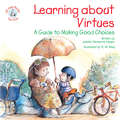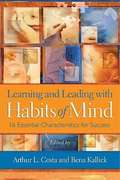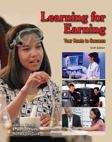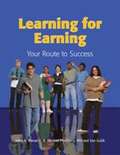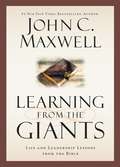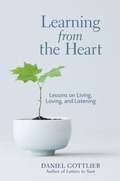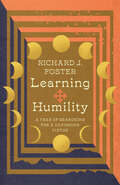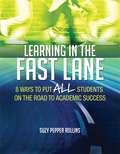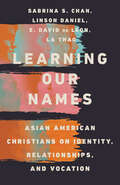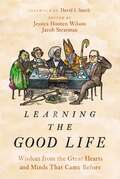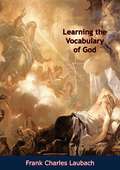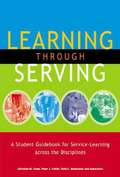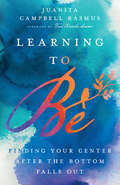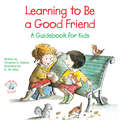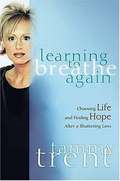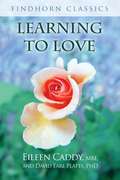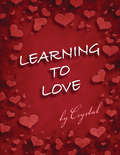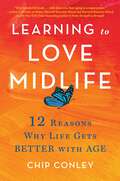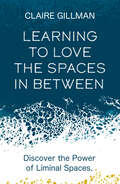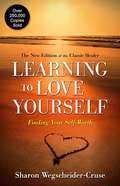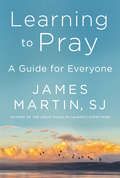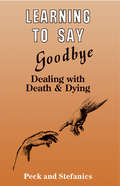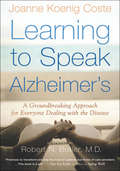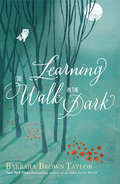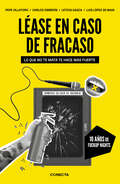- Table View
- List View
Learning about Virtues: A Guide to Making Good Choices
by R. W. Alley Juliette Garesché DagesThis book introduces the concept and basic vocabulary of virtues. It helps children to recognize and label the behaviors which they are striving to develop. When a child attains a virtue, that trait will become almost habitual for them. But it isn't always easy. Life produces many challenges, and today's culture often seems to oppose virtue. However, through faith, example, and practicing individual virtues, a child will keeping growing through adulthood, planting more seeds of God's goodness along the way. We hope you have fun introducing virtues to the children in your life. This book is just the start. Be creative, and don't forget to catch your children being good! Praise their every effort toward goodness and God-likeness.
Learning and Leading With Habits of Mind: 16 Essential Characteristics for Success
by Arthur L. Costa Bena KallickIn Learning and Leading with Habits of Mind, noted educators Arthur L. Costa and Bena Kallick present a comprehensive guide to shaping schools around Habits of Mind. The habits are a repertoire of behaviors that help students and teachers successfully navigate the various challenges and problems they encounter in the classroom and in everyday life. The Habits of Mind include: Persisting, Managing impulsivity, Listening with understanding and empathy, Thinking flexibly, Thinking about thinking (metacognition), Striving for accuracy, Questioning and posing problems, Applying past knowledge to new situations, Thinking and communicating with clarity and precision, Gathering data through all senses, Creating, imagining, innovating, Responding with wonderment and awe, Taking responsible risks, Finding humor, Thinking interdependently, Remaining open to continuous learning.
Learning for Earning: Your Route to Success, 6th Edition
by John A. Wanat E. Weston Pfeiffer Richard Van GulikLearning for Earning presents the skills students need to succeed in school, on the job, and on their own. Teacher's Wraparound Edition provides teaching aids in the page margins for reviewing and reinforcing text content plus challenging activities that extend learning. The text includes a running glossary to highlight new terms presented in the chapters.
Learning for Earning: Your Route to Success
by John A. Wanat E. Weston Pfeiffer Richard Van GulikFocuses on helping students understand self first, then making a career match. Identifies the workplace know-how needed for success on the job, as determined by the Secretary's Commission on Achieving Necessary Skills (SCANS).
Learning from the Giants: Life and Leadership Lessons from the Bible (Giants of the Bible)
by John C. MaxwellIf you could spend a few minutes with the giants of faith in the Old Testament in person, what lessons would they share with you? In LEARNING FROM THE GIANTS John C. Maxwell draws on fifty years of studying the Bible to share the stories of Elijah, Elisha, Job, Jacob, Deborah, Isaiah, Jonah, Joshua and Daniel. These people fought and won epic battles, served kings, and endured great hardships for God to come out on the other side transformed through His grace. Through them Maxwell explores timeless lessons we can learn about leadership, ourselves, and our relationship with God.
Learning from the Heart: Lessons on Living, Loving, and Listening
by Daniel GottliebIn the nearly 30 years since the accident that made radio personality and columnist Dan Gottlieb a quadriplegic, he developed a finely-tuned quality of awareness that most people never achieve: he became an outsider among us--"like a foreign correspondent," as he puts it. From that vantage point, he has acutely observed the way people act, think, feel, and live--in short, he studied and learned exactly what it means to be human. Here, Dan shares his insights, written with humor, honesty, a gift for storytelling, and breathtaking compassion. Learning from the Heart looks at what divides as well as unites us, including the problems of family life; difficulties confronting today's parents; challenges faced by the disabled and the aging; and issues of injustice that affect the way we understand the world and our lives. Although Dan is now speaking directly to the reader, rather than to his own family, you'll recognize the distinctive voice and format that caused an outpouring of e-mail from fans of Letters to Sam: short anecdotal chapters rich in wisdom, generously revealing and deeply personal, and resonating with universal truths.
Learning Humility: A Year of Searching for a Vanishing Virtue
by Richard J. FosterIn a society where raging narcissism dominates the moral landscape, the virtue of humility is often dismissed as irrelevant.Learning HumilityJoin Richard Foster on the journey toward a life of humility, which he says leads us into "freedom, joy, and holy hilarity."
Learning In The Fast Lane: 8 Ways To Put All Students On The Road To Academic Success
by Suzy Pepper RollinsToo often, students who fail a grade or a course receive remediation that ends up widening rather than closing achievement gaps. According to veteran classroom teacher and educational consultant Suzy Pepper Rollins, the true answer to supporting struggling students lies in acceleration. In Learning in the Fast Lane, she lays out a plan of action that teachers can use to immediately move underperforming students in the right direction and differentiate instruction for all learners—even those who excel academically. This essential guide identifies eight high-impact, research-based instructional approaches that will help you <p><p> * Make standards and learning goals explicit to students. <p> * Increase students' vocabulary—a key to their academic success. <p> * Build students' motivation and self-efficacy so that they become active, optimistic participants in class. <p> * Provide rich, timely feedback that enables students to improve when it counts. <p> * Address skill and knowledge gaps within the context of new learning. <p> Students deserve no less than the most effective strategies available. These hands-on, ready-to-implement practices will enable you to provide all students with compelling, rigorous, and engaging learning experiences.
Learning Our Names: Asian American Christians on Identity, Relationships, and Vocation
by Sabrina S. Chan Linson Daniel E. David de Leon La ThaoWhat's your name?Asian Americans know the pain of being called names that deny our humanity. We may toggle back and forth between different names as a survival strategy. But it's a challenge to discern what names reflect our true identities as Asian Americans and as Christians. In an era when Asians face ongoing discrimination and marginalization, it can be hard to live into God's calling for our lives.Asian American Christians need to hear and own our diverse stories beyond the cultural expectations of the model minority or perpetual foreigner. A team from East Asian, Southeast Asian, and South Asian backgrounds explores what it means to learn our names and be seen by God. They encourage us to know our history, telling diverse stories of the Asian diaspora in America who have been shaped and misshaped by migration, culture, and faith. As we live in the multiple tensions of being Asian American Christians, we can discover who we are and what God may have in store for us and our communities.
Learning the Good Life: Wisdom from the Great Hearts and Minds That Came Before
by Jessica Hooten Wilson Jacob StratmanDiscover the Good Life as You Learn from the Wise Voices of the PastWe've lost ourselves. Disconnected from the past and uncertain about the future, we are anxious about what our lives will be and troubled by a nagging sense of meaninglessness. Adrift in the world, many Christians have their identity completely wrapped up in work and their definition of the "good life" is financial success. Fewer of are staying committed to the Christian faith, finding it difficult to reconcile their experience with their longings and desires. With so much uncertainty, where can we find a true vision of "the Good Life"?Learning the Good Life speaks to this malaise with trusted and assured voices from the past, inviting Christians into an age-old conversation with some of history's wisest hearts and minds as their dialogue companions. Featuring classic writings from a diverse lineup of over 35 writers and thinkers including Confucius, Augustine, Sor Juana Inés de la Cruz, W.E.B. DuBois, Flannery O'Connor, and Wendell Berry. Together these sages of the past address important issues such as:VocationCallingMeaningSufferingBeautyVirtueLearningWisdomCritical ThinkingCommunityWonderReflectionAnd moreEach of these texts are introduced by experts who are teachers, from a variety of Christian colleges and universities, to help providing a broader, richer, and more cohesive narrative in which Christians may participate. In addition to a substantive introduction, each text is accompanied by discussion questions to provoke further thought and contemplation and also to facilitate discussion when used in groups. Ideal for any Christian seeking a deeper connection to the wisdom of the past and wanting a more cohesive and beautiful vision of the good life. All the writers have a message for you. All of them are calling you to die to yourself, to your habits of indulgence, to your pride and ambition, and instead, dedicate your time to learning, thinking, and loving.Writers and writings featured in Learning the Good Life include:Lao Tzu, From Tao Te ChingConfucius, SelectionsPlato, The Allegory of the CaveSeneca the Younger, "On the Shortness of Life"Athanasius, On the IncarnationGregory of Nazianzus, On My Own VersesAugustine, On the TeacherAugustine, On Christian Doctrine, Book I.Pope Gregory the Great, Life of Saint Benedict, Dialogues, Book 2Dante Alighieri, The Divine Comedy, Inferno 1Nezahualcoyotl, "A Flower Song of Nezahualcoyotl"Margery Kempe, From "The Book of Margery Kempe"William Shakespeare, King LearJohn Amos Comenius, From The Labyrinth of the World and the Paradise of the HeartGeorge Herbert, Five PoemsBlaise Pascal, SelectionsMatsuo Basho, Three Haiku PoemsSor Juana Ines de la Cruz, "Respuesta a Sor Filotea de la Cruz"John Milton, AreopagiticaJonathan Edwards, "Personal Narrative"Edmund Burke, Reflections on the Revolution in FranceLord Alfred Tennyson, "Ulysses"Frederick Douglass, Narrative LifeElizabeth Barrett Browning, from Aurora LeighHenry David Thoreau, "Life Without Principle"Gerard Manley Hopkins, "As Kingfishers Catch
Learning the Vocabulary of God: A Spiritual Diary
by Frank Charles LaubachFrank Charles Laubach was an Evangelical Christian missionary and mystic known as "The Apostle to the Illiterates." It was a daily record of an effort to hear God's instructions, minute by minute, and to carry them out in a new, creative field which was far beyond anything the author had undertaken.-Print ed.
Learning Through Serving: A Student Guidebook for Service-Learning Across the Disciplines
by Christine M. Cress Peter J. Collier Vicki L. ReitenauerThis book is intended as a self-directed guide for college-level students who are engaged in service-learning. It is also suitable for students working individually.
Learning to Be: Finding Your Center After the Bottom Falls Out
by Juanita Campbell RasmusIt felt as though every nerve in my body was popping. Imagine large strong hands slowly applying pressure while breaking a family-size package of uncooked, dry spaghetti. I was the spaghetti. Breaking down one piece at a time. This is how Juanita Rasmus begins the wise, frank, and witty account of what she later called "The Crash" and what her counselor labeled "a major depressive episode." This experience landed Juanita, a busy pastor, mother, and community leader, in bed. In addition to exhaustion and depression, on the spiritual front she experienced a dark night of the soul. When everything in her life finally came to a stop, she found that she had to learn to be—with herself and with God—all over again. Pastor Juanita writes from her life with kind attention to the life of the reader. She offers both practical and spiritual insights but never pat answers. If you are longing for a trustworthy companion through dark days, this book is here for you. Each chapter includes life-giving spiritual practices to help you discover your own new ways of being.
Learning to Be a Good Friend
by R. W. Alley Christine A AdamsLearning to Be a Good Friend allows adults to show kids how to cultivate friendship. It discusses behaviors that foster friendships, as well as those that drive friends away. It illustrates the pitfalls of peer pressure, and what to do when you can't find a friend or have lost your best friend.
Learning to Breathe Again: Choosing life and Finding Hope After a Shattering Loss
by Tammy TrentThis is the story of one young woman who copes with the devastating loss of her best friend and husband. She points to our true help, Jesus Christ.
Learning to Love
by Eileen Caddy David Earl PlattsAn insightful guide for consciously bringing compassion and love into your life • Explores feelings, attitudes, beliefs, and past experiences that block us from loving and receiving love • Includes deceptively simple yet profound exercises, meditations, and visualizations to support the exploration of your inner world • Explains how these principles and techniques originated in Roberto Assagioli’s system of psychosynthesis, enriched by the Findhorn experience of living in community Every person is born with the capacity to love. Over time, however, many of us have built barriers within ourselves as a reaction to painful experiences, and following these, we often develop fears, beliefs, and behaviors that keep these barriers firmly in place. The primary lesson in life is to learn to love, and this starts right on our doorstep. Often it is self-doubt and feelings of unworthiness that hold us back from experiencing all the love around us. Only when we start to love and accept ourselves with all that we are can we love others freely and fully. Learning to love requires an intention to change and a willingness to take action. Once we understand how to work with our doubts and fears and learn how to change our beliefs and behavior, our barriers will melt away and we spontaneously open up to connect deeply and harmoniously with the full flow of the river of life. In this simple yet insightful guide, Eileen Caddy and David Earl Platts detail the down-to-earth practicalities of exploring feelings, attitudes, beliefs, and past experiences that block us from loving and from receiving love. They show how bringing more love into our lives is not a mystery but often a journey back to ourselves and our core values. The authors examine the feelings of acceptance, trust, forgiveness, respect, opening up, and taking risks, among others, within a framework of compassionate understanding and non-judgment. Deceptively simple yet profound exercises, meditations, and visualizations support the reader in examining their inner world and implementing these vital concepts into their lives. The teachings in the book are based on popular workshops that Eileen, co-founder of the Findhorn Foundation Community, and David facilitated for years in and outside Findhorn. Many of the underlying principles and techniques originate in the system of psychosynthesis, devised by Roberto Assagioli. Learning to Love invites you to make a free and informed choice to bring more love into your life, and then helps you implement this choice step-by-step with confidence and joy.
Learning to Love: A Journey To Loving Yourself
by Crystal ThomasFilled with affirmations, and thought-provoking questions, "Learning to Love" combines the author's personal experience of discovering the importance of putting time and energy into loving ourselves first with her professional knowledge of the crucial part that relationships play in every aspect of our lives. This guidebook helps us understand ourselves and the power that we have in creating our lives every moment of every day.
Learning to Love Midlife: 12 Reasons Why Life Gets Better with Age
by Chip ConleyNew York Times bestselling author and co-founder/CEO of The Modern Elder Academy inspires readers to embrace midlife as a time of joy in this &“clear blueprint for creating the lives we want&” (Gretchen Rubin) The midlife crisis is the butt of so many jokes, but this long-derided life stage has an upside. What if we could reframe our thinking about the natural transition of midlife not as a crisis, but as a chrysalis—a time when something profound awakens in us, as we shed our skin, spread our wings, and pollinate our wisdom to the world? In Learning to Love Midlife, Chip Conley offers an alternative narrative to the way we commonly think of our 40s, 50s and 60s. Drawing on the latest social science research, inspiring stories, and timeless wisdom, he reveals 12 reasons why life gets better with age. They include: The relief of &“my body doesn&’t define me:&” We finally grow comfortable in our own skin Stepping off the treadmill: We redefine what a successful life looks like The &“Great Midlife Edit:&” We let go of our emotional baggage, mindsets, and obligations that no longer serve us Growing whole: We begin to feel a part of something bigger than ourselves No matter where you are in your midlife journey, this perspective‑shifting guide will inspire you to find joy, purpose and success in the years that lie ahead—and how those years can be your best ones yet.
Learning to Love the Spaces in Between: Discover the Power of Liminal Spaces
by Claire GillmanThe word liminal comes from the Latin word 'limen', meaning threshold. In its literal sense, a threshold is a doorway. 'Liminal' is often used to describe the gateway between two stages.A liminal space can be a metaphysical state – the place between sleep and wakefulness, between life and death where consciousness is altered, the transition period between one life event and the next; or it can be a physical space – the coastline between sea and shore, an empty art gallery, or the moment just before it rains.In an age where so much importance is placed on facts and explanations, the feelings we derive from liminal 'unknown' spaces can disrupt our equilibrium. Yet these 'spaces in between' are often where insight, creativity and inspiration are found.Here, life-long liminal explorer and journalist Claire Gillman helps us learn and grow through our experiences of liminality. Featuring contributions from leading luminaries including Bruce Parry, Caroline Myss, Dr Eben Alexander, Neale Donald Walsch, Phyllis Curott, Yasmin Boland, Dr Robert Holden, Satish Kumar, Dr Mike Dow and Felicity Warner, Claire shows us how we can navigate and embrace liminal experiences to enhance our wellbeing and understanding of the world.
Learning to Love Yourself: Finding Your Self-Worth
by Sharon Wegscheider-CruseWe all come into this world full of promise and possibility. For some, when born into a healthy and highly functional family, the journey is quite easy, with guideposts and directions given freely. However, that is a very small population of people. Most of us were born into families that were in their own way struggling for independence, accomplishment, safety or security. For the millions of people who grew up in painful families, whether by absent parents, abusive parents, or those who were ill-equipped, noted therapist Sharon Wegscheider-Cruse shows that they do not have to follow a family tradition of compulsion or addiction. In the revised edition of the classic Learning to Love Yourself, Wegscheider-Cruse explains that it is possible to create our own self-worth at any time in our lives, even as adults. She guides readers on a journey to greater self-worth, explaining how to eliminate toxic self-defeating messages, how to choose healthier, new perspectives, and how to reinvent yourself each day open to a world of possibilities.
Learning to Pray: A Guide for Everyone
by James MartinOne of America’s most beloved spiritual leaders and the New York Times bestselling author of The Jesuit Guide to (Almost) Everything and Jesus: A Pilgrimage teaches anyone to converse with God in this comprehensive guide to prayer.In The Jesuit Guide to (Almost) Everything, Father James Martin included a chapter on communicating with God. Now, he expands those thoughts in this profound and practical handbook. Learning to Pray explains what prayer is, what to expect from praying, how to do it, and how it can transform us when we make it a regular practice in our lives. A trusted guide walking beside us as we navigate our unique spiritual paths, Martin lays out the different styles and traditions of prayer throughout Christian history and invites us to experiment and discover which works best to feed our soul and build intimacy with our Creator. Father Martin makes clear there is not one secret formula for praying. But like any relationship, each person can discover the best style for building an intimate relationship with God, regardless of religion or denomination. Prayer, he teaches us, is open and accessible to anyone willing to open their heart.
Learning To Say Goodbye: Dealing With Death And Dying
by Rosalie Peck Charlotte StefanicsFirst published in 1987. Routledge is an imprint of Taylor & Francis, an informa company.
Learning to Speak Alzheimer's: A Groundbreaking Approach for Everyone Dealing with the Disease
by Robert Butler Joanne Koenig CosteMore than four million Americans suffer from Alzheimer's, and as many as twenty million have close relatives or friends with the disease. Revolutionizing the way we perceive and live with Alzheimer's, Joanne Koenig Coste offers a practical approach to the emotional well-being of both patients and caregivers that emphasizes relating to patients in their own reality. Her accessible and comprehensive method, which she calls habilitation, works to enhance communication between carepartners and patients and has proven successful with thousands of people living with dementia. Learning to Speak Alzheimer's also offers hundreds of practical tips, including how to · cope with the diagnosis and adjust to the disease's progression · help the patient talk about the illness · face the issue of driving · make meals and bath times as pleasant as possible · adjust room design for the patient's comfort · deal with wandering, paranoia, and aggression
Learning to Walk in the Dark: Because God Often Shows Up At Night
by Barbara Brown TaylorFollow Barbara Brown Taylor on her journey to understand darkness, which takes her spelunking in unlit caves, learning to eat and cross the street as a blind person, discovering how "dark emotions" are prevented from seeing light from a psychiatrist, and rereading scripture to see all the times God shows up at night. With her characteristic charm and wisdom, Taylor is our guide through a spirituality of the nighttime, teaching us how to find God even in darkness, and giving us a way to let darkness teach us what we need to know.de through a spirituality of the nighttime, teaching us how to find our footing in times of uncertainty and giving us strength and hope to face all of life's challenging moments.
Léase en caso de fracaso: Lo que no te mata te hace mas fuerte
by Carlos Zimbrón Leticia GascaEste libro se enriquece con historias de fracaso emblemáticas que han pasado por Fuckup Nights a nivel internacional. Incluso también reveladoras anécdotas ocurridas al interior del movimiento que dan cuenta de sus propias derrotas, pero también de su evolución. Hace 10 años unos amigos compartieron sus metidas de pata y unas chelas en la Ciudad de México y descubrieron lo poderoso que puede ser aprender de ello. Hoy Fuckup Nights se ha convertido en un movimiento que investiga, cuestiona y resignifica el fracaso y que ha dado a conocer más de 15 mil historias a más de un millón 200 mil personas en más de 300 ciudades y en más de 90 países, de la mano de cientos de empresas que buscan construir culturas organizacionales más innovadoras. Tras una década de analizar cientos de historias, los cuatro fundadores de Fuckup Nights y el Failure Institute nos comparten qué han aprendido sobre el fracaso: sus orígenes en nuestra cultura, cómo el capitalismo y su culto al éxito individual fomentan el tabú, qué factores y comportamientos lo detonan, cuáles son sus señales, cómo impacta nuestras emociones, cómo comunicarlo a tu equipo, qué rituales de consolación puedes añadir a tu rutina, consejos no solicitados y a qué conclusiones ha llegado esta comunidad de rebeldes
